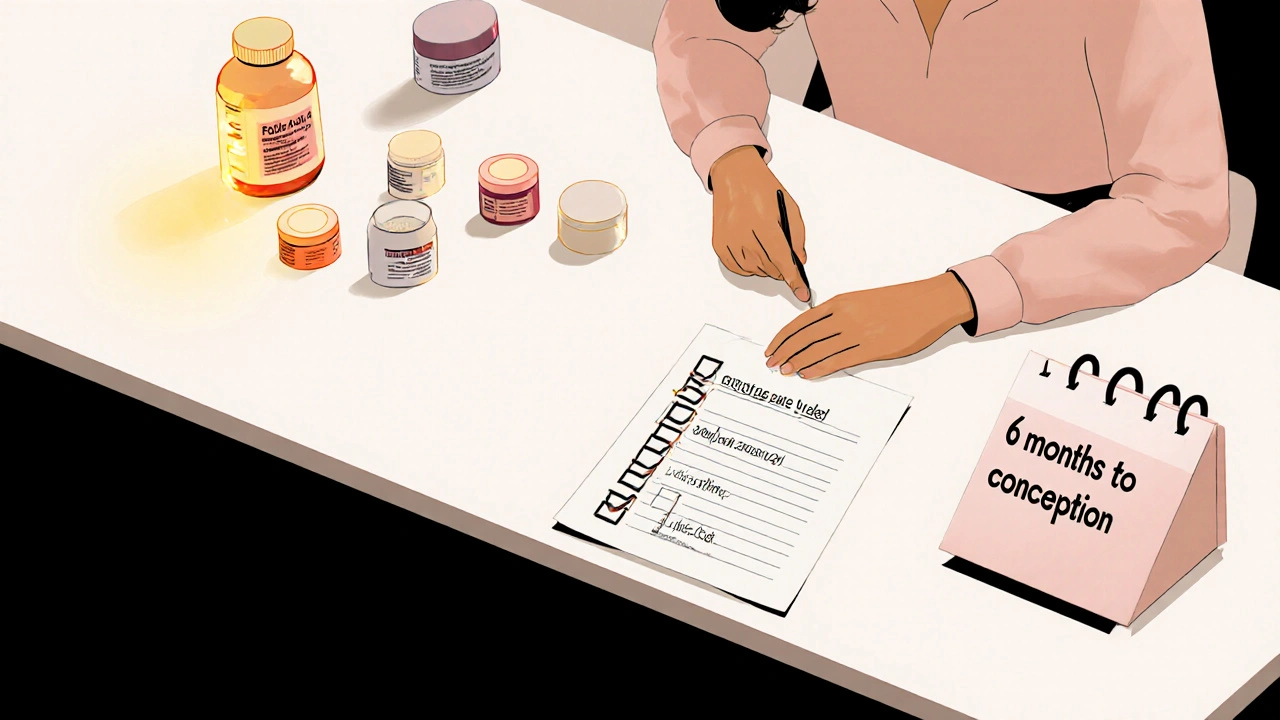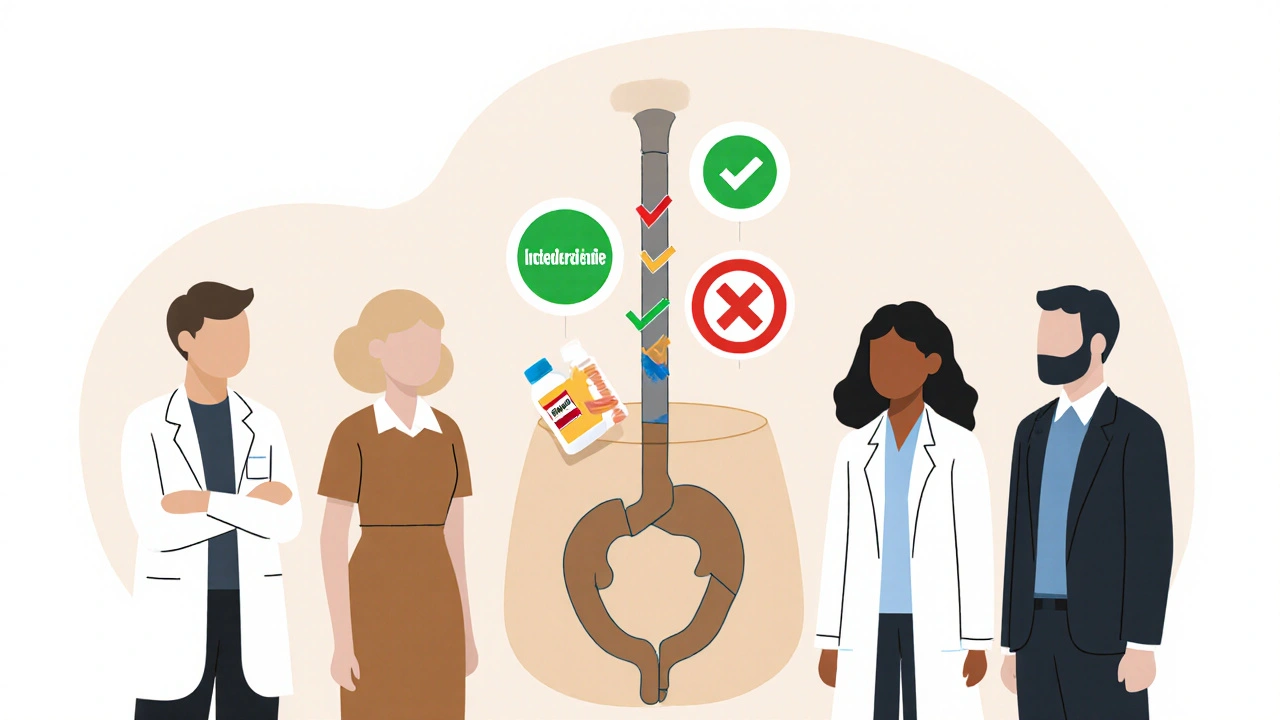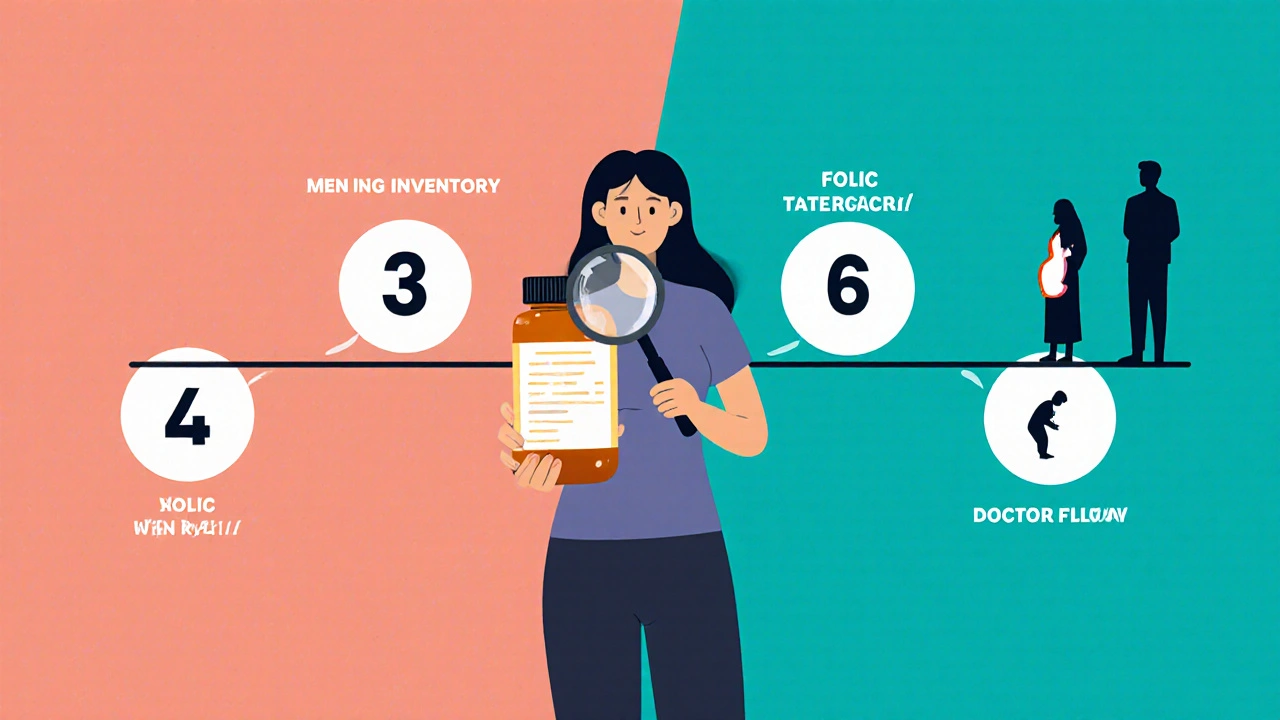
Most women don’t realize they’re pregnant until they’re already 4 to 6 weeks along. By then, the baby’s heart, brain, spine, and limbs have already begun forming - and if you’re taking certain medications, those early weeks could be the most dangerous time for your baby. The good news? You don’t have to wait until you’re pregnant to act. Creating a medication plan before conception is one of the most powerful steps you can take to protect your future child’s health - and your own.
Why Timing Matters More Than You Think
The first 8 weeks of pregnancy are when the baby’s major organs develop. This happens before most people even miss a period. That’s why waiting until you confirm pregnancy to review your meds is too late. If you’re on a medication that’s known to cause birth defects - like valproic acid for seizures or isotretinoin for acne - the damage can already be done before you know you’re pregnant. According to the American College of Obstetricians and Gynecologists (ACOG), nearly half of all pregnancies in the U.S. are unplanned. That means millions of women are exposed to potentially harmful drugs during those critical early weeks without even realizing it. The solution isn’t to stop taking your meds - it’s to plan ahead.Start With a Full Medication Inventory
Don’t just think about prescriptions. Make a list of everything you take:- Prescription drugs (even if you’ve been on them for years)
- Over-the-counter medicines (ibuprofen, cold pills, acid reducers)
- Supplements (vitamins, herbal teas, fish oil, melatonin)
- Topical treatments (acne creams, steroid ointments, retinoids)
- Recreational substances (nicotine, alcohol, cannabis)
Key Medications to Review and Adjust
Here are the most common medications that need attention before conception:Folic Acid - Non-Negotiable
Every woman planning pregnancy should take folic acid - no exceptions. The World Health Organization recommends 400 mcg daily for all women aged 15 to 49. But if you have epilepsy, diabetes, obesity, or a family history of neural tube defects, you’ll need 4 to 5 mg daily. That’s 10 times more than the standard dose. Start at least 3 months before trying to conceive. Studies show this reduces the risk of spina bifida and other serious birth defects by up to 70%.Antiseizure Drugs
Valproic acid (Depakote) is one of the most dangerous drugs for pregnancy. It raises the risk of major birth defects to nearly 11%. Topiramate (Topamax) increases the chance of cleft lip or palate. If you have epilepsy, work with your neurologist to switch to safer options like lamotrigine or levetiracetam - and make sure you’re on the lowest effective dose. Never stop your seizure meds cold turkey. Seizures during pregnancy are just as risky as the drugs.Antidepressants and Mood Stabilizers
Lithium can cause a rare heart defect called Ebstein’s anomaly. SSRIs like fluoxetine are generally safer, but they still carry some risk. If you’re on lithium, valproate, or carbamazepine, your doctor may recommend switching to sertraline or citalopram. The goal isn’t to stop treatment - it’s to find the safest option for both you and your baby.Thyroid Medication
If you have hypothyroidism, your body needs more levothyroxine during pregnancy. Your TSH should be under 2.5 mIU/L before you conceive. Once pregnant, your dose will likely need to increase by 30% within weeks. Waiting until you’re pregnant to adjust your thyroid meds increases your risk of miscarriage by 60%.Anticoagulants
Warfarin (Coumadin) crosses the placenta and can cause fetal warfarin syndrome - facial deformities, bone problems, and developmental delays. If you need blood thinners for a clotting disorder, switch to low-molecular-weight heparin (like Lovenox) before conception. It doesn’t cross the placenta and is safe throughout pregnancy.Autoimmune and Cancer Drugs
Methotrexate, cyclophosphamide, and leflunomide are all high-risk. They can cause miscarriage, organ damage, or long-term developmental issues. You must stop methotrexate at least 3 months before trying to conceive. Leflunomide requires a special washout procedure using cholestyramine. Always consult your rheumatologist - some safer alternatives like sulfasalazine can be continued.HIV Medications
If you’re living with HIV, achieving an undetectable viral load before pregnancy is critical. The goal is under 50 copies/mL. Modern antiretrovirals like dolutegravir or tenofovir are safe and effective. With proper planning, the chance of passing HIV to your baby drops from 25% to less than 1%.What About Supplements and Herbal Products?
Just because something is "natural" doesn’t mean it’s safe during pregnancy. St. John’s wort can interfere with antidepressants and birth control. Black cohosh may trigger contractions. High-dose vitamin A (over 10,000 IU) can cause skull and heart defects. Even some fish oil supplements can contain mercury or PCBs if not purified. Stick to prenatal vitamins with folic acid, iron, and DHA. Avoid anything with untested herbs or mega-doses. Your doctor can help you pick a brand that meets clinical standards.
Timing Is Everything - Plan for 3 to 6 Months
You can’t fix everything overnight. Some medications need time to clear your system:- Isotretinoin (Accutane): Wait 1 month after stopping
- Methotrexate: Wait 3 months (at least 3 full menstrual cycles)
- Leflunomide: Requires washout with cholestyramine - takes 2 to 3 months
- Chronic conditions like lupus or diabetes: May need 6 months to stabilize
Who Should Be on Your Team?
This isn’t just your OB/GYN’s job. You need a team:- Primary care doctor - Coordinates your overall plan
- OB/GYN or maternal-fetal medicine specialist - Focuses on pregnancy risks
- Neurologist - If you have seizures
- Rheumatologist - If you have lupus, RA, or other autoimmune diseases
- Psychiatrist - If you’re on mood stabilizers or antidepressants
- Pharmacist - Can flag drug interactions and suggest safer alternatives
What If You’re Already Pregnant?
If you’re already pregnant and haven’t reviewed your meds, don’t panic. Call your doctor right away. Many medications can be switched safely in early pregnancy. The goal now is to minimize further risk. Don’t stop anything without medical advice - sudden withdrawal can be dangerous.
Barriers and Real-World Challenges
Even though the science is clear, most women don’t get this care. Only 24% of OB/GYNs in the U.S. consistently review medications before pregnancy. Many women don’t even know it’s a thing. If your doctor doesn’t bring it up, you have to ask. Health systems are still catching up. In countries like Sweden and the Netherlands, preconception care is part of routine health visits. In the U.S., it’s often an afterthought. But that’s changing. Digital tools like Luma Health’s Preconception Navigator now help providers cross-check medications against teratogenicity databases in seconds.Your Action Plan - Simple Steps to Start Today
1. Write down every medication, supplement, and substance you take. Include doses and how often. 2. Call your doctor. Ask: "I’m thinking about getting pregnant. Can we review my meds?" 3. Start 400-800 mcg of folic acid daily. If you have a high-risk condition, ask about 4-5 mg. 4. Stop using tobacco, alcohol, and recreational drugs. These affect egg quality and fetal development. 5. Set a 6-month timeline. Schedule follow-ups with your specialists. 6. Use ICD-10 code Z31.69 if you’re documenting this visit - it helps track care quality.What Happens After You Conceive?
Your medication plan doesn’t end at conception. You’ll need ongoing monitoring. Thyroid levels, blood pressure, and medication doses often change during pregnancy. Keep your team updated. Many women switch medications again in the second or third trimester. The goal isn’t perfection - it’s progress. Even small changes made before conception can have a huge impact. One study in the New England Journal of Medicine found that women who received preconception counseling had 28% fewer major birth defects than those who didn’t. This isn’t about fear. It’s about control. You’re not just preparing for pregnancy - you’re giving your future child the best possible start.Is it safe to take ibuprofen before getting pregnant?
Occasional use of ibuprofen before conception is generally low-risk, but it’s best to avoid it regularly. NSAIDs like ibuprofen can interfere with ovulation and implantation. Switch to acetaminophen (Tylenol) if you need pain relief while trying to conceive. Always check with your doctor if you’re taking it daily for a chronic condition like arthritis.
Can I keep taking my antidepressants if I’m planning a pregnancy?
Many antidepressants are safe during pregnancy, but not all. SSRIs like sertraline and citalopram are considered low-risk. Avoid paroxetine and high-dose fluoxetine unless necessary. Never stop antidepressants abruptly - this can trigger relapse. Work with your psychiatrist to find the safest option and lowest effective dose before conception.
Do I need to stop birth control before trying to conceive?
You can stop hormonal birth control right away. Most women ovulate again within a month. But if you’re on certain epilepsy meds like carbamazepine, your birth control may not work well - even if you take it perfectly. Talk to your doctor about switching to a non-hormonal method (like copper IUD) or using a backup method like condoms while you adjust your meds.
What if I have a chronic illness like diabetes or lupus?
Chronic conditions require extra planning. For diabetes, aim for an A1C under 6.5% before conception to reduce miscarriage and birth defect risks. For lupus, wait until your disease is in remission for at least 6 months. Both conditions need close coordination between your OB/GYN, endocrinologist, or rheumatologist. Your medication plan will be more complex, but with proper timing, you can have a healthy pregnancy.
Are natural supplements like evening primrose oil safe before pregnancy?
Evening primrose oil is often marketed for fertility, but there’s no solid evidence it helps. More importantly, it may stimulate contractions and isn’t recommended in early pregnancy. Stick to prenatal vitamins with proven ingredients: folic acid, iron, and DHA. Avoid unregulated herbal supplements - their safety during conception isn’t tested.

Richard Wöhrl
November 21, 2025 AT 15:49Just wanted to add-folic acid isn’t just for neural tube defects. Recent studies show it also supports placental development and reduces risk of preterm birth, even in low-risk moms. And if you’re on methotrexate or antiepileptics? You need the high-dose (4-5mg) even if you don’t have a family history. Don’t rely on OTC prenatal vitamins-they usually have 800mcg max. Get a prescription or a compounding pharmacy brand like Thorne or Seeking Health. Seriously, this is non-negotiable.
Laurie Sala
November 22, 2025 AT 14:26Wait-so you’re telling me I can’t just take my Advil for cramps anymore??!! I’ve been popping them like candy since I was 16!! And now you want me to switch to Tylenol?? But what if Tylenol gives me liver issues?? And what if I’m allergic?? And what if I just… don’t want to??
Brandy Walley
November 24, 2025 AT 03:48lol this is just fear porn for anxious women. You think your baby’s gonna turn into a lizard because you took ibuprofen once? Wake up. Nature’s been doing this for millions of years without a pharmacist’s checklist.
Kezia Katherine Lewis
November 26, 2025 AT 00:06As a reproductive endocrinologist’s assistant, I’ve seen too many cases where women panic after discovering pregnancy and abruptly stop SSRIs or anticonvulsants. The real danger isn’t the meds-it’s the withdrawal. We have evidence-based alternatives for nearly every category now. The key is early collaboration with a teratology specialist. I’ve personally coordinated 37 preconception med reviews in the last year alone-every single one resulted in a healthy term delivery. It’s not about restriction; it’s about precision pharmacology.
John Mackaill
November 27, 2025 AT 00:57I’m from the UK and we’ve had preconception counseling built into GP visits for over a decade. It’s not a luxury-it’s standard care. The NHS even has a digital tool that auto-generates a medication risk report based on your prescription history. If you’re in the US and your OB doesn’t bring this up, ask for a referral to a maternal-fetal medicine clinic. You’re not being difficult-you’re being proactive. And honestly? That’s what good parenting starts with.
Pramod Kumar
November 28, 2025 AT 00:12Man, this post is like a love letter to future babies. I’m from India, where most women still think ‘pregnancy’ starts when they miss a period. We don’t talk about meds, we don’t talk about folic acid, we just pray. But this? This is the kind of info that could save a whole generation. I’m printing this out and handing it to my sister-in-law. And yes-I’m making her stop that ‘herbal fertility tea’ she’s been drinking since Diwali. No more ‘natural’ nonsense without data.
Lisa Detanna
November 28, 2025 AT 15:48Let’s be real-this isn’t just about meds. It’s about women being treated like medical projects instead of people. I had to fight for 6 months just to get my psychiatrist to switch me from paroxetine to sertraline. No one asked how I felt. No one asked if I was scared. But I did it. And now I’m pregnant and stable. So yes, plan ahead. But also-ask for emotional support. Your meds matter, but so does your peace.
Adrian Rios
November 29, 2025 AT 22:59Look-I’m a guy. I don’t get pregnant. But I’ve watched my wife go through this. And let me tell you-this isn’t just ‘women’s health.’ It’s family health. I had to learn what teratogenic meant. I had to research which fish oil brands are mercury-free. I had to sit through three different pharmacy consultations. And honestly? It felt invasive. But when our daughter was born healthy, with no defects, no hospital stays, no neonatal ICU? I cried. Not because I was relieved-I was proud. Because we did the work. And if you’re reading this and thinking ‘this is too much’? Then you haven’t met a child who’s suffered because someone didn’t plan ahead. This isn’t fear. It’s love in action.
Casper van Hoof
December 1, 2025 AT 04:38One must interrogate the epistemological foundations of preconception pharmaceutical intervention. Is the reduction of birth defect incidence truly a moral imperative, or merely a technocratic aspiration? The discourse surrounding teratogenicity often obscures the ontological autonomy of the pregnant body. One cannot reduce fetal development to a pharmacokinetic equation without erasing the phenomenological experience of the woman who carries it. While the clinical guidelines are empirically sound, their cultural imposition risks reinforcing a biomedical hegemony that pathologizes natural reproductive processes.
shreyas yashas
December 1, 2025 AT 12:36My cousin took lamotrigine while pregnant. Had a healthy baby. No issues. But her doc didn’t tell her anything until she was 10 weeks in. She almost panicked. If someone had just handed her this list 6 months earlier? She’d’ve been chill. So yeah-this info is gold. Just make sure it’s easy to find. Not buried in a 10-page PDF. Maybe a one-pager? Or even a TikTok?
Suresh Ramaiyan
December 2, 2025 AT 07:31It’s funny-people think planning ahead means losing freedom. But really, it’s the opposite. When you know what’s safe, you stop worrying. You stop second-guessing every headache or cold. You stop feeling guilty for taking a pill. Planning gives you back control-not over nature, but over your choices. And that’s the quietest kind of power. You’re not changing your body. You’re honoring it.
Katy Bell
December 3, 2025 AT 22:51Just got off the phone with my OB. She said ‘oh, you’re thinking about getting pregnant? We’ll talk about meds next time.’ I said ‘next time’ is 3 weeks away. I’m already 2 months into my folic acid. I’m done waiting for permission. I’m doing this for me. And if my doctor doesn’t get it? I’ll find someone who does.